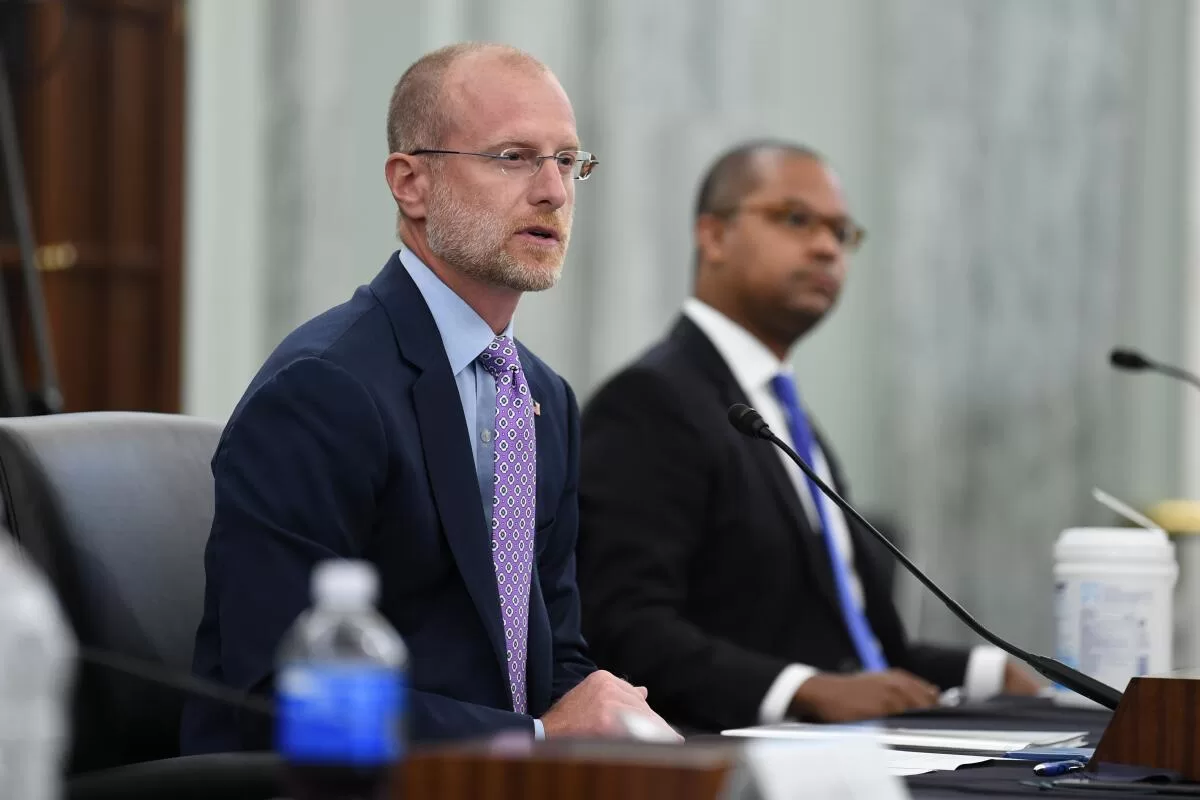President-elect Trump’s nomination of Brendan Carr as the next chairman of the Federal Communications Commission is bringing both hope and fear to the media industry.
For media executives, the hope comes in the promise of industry consolidation.
Companies such as Fox Television Stations, Nexstar Media Group, Tegna and Gray Media are eager to buy more TV stations to better compete against deep-pocketed tech firms that are aggressively pursuing viewers and ad dollars. Carr is expected to support revisiting the rule on ownership of TV stations.
Brendan Carr answers questions during a Senate Commerce, Science, and Transportation Committee hearing in June 2020.
(Jonathan Newton / Associated Press)
The trepidation comes from Carr’s open criticism of broadcasters and tech firms on behalf of Trump, who is famously hostile to journalists and outlets that criticize him. Carr, a Republican nominated to the FCC during Trump’s first term in 2017 and again by President Biden in 2023, wrote the chapter on the FCC in the conservative policy blueprint Project 2025.
During the election, he jumped on social media when Vice President Kamala Harris appeared on the Nov. 2 episode of NBC’s “Saturday Night Live” to point out that the network also owed an invitation to Trump under the FCC’s equal time provision.
NBC obliged, giving Trump time at the end of a NASCAR race and following “Sunday Night Football.” (Carr also received a public note from NBC parent Comcast congratulating him on his nomination.)
Carr got the industry’s attention again on Tuesday when he told Fox News that his recommendation on the Paramount Global merger with Skydance Media would consider recent accusations from Trump’s camp that CBS News edited its “60 Minutes” interview with Harris to make her sound more coherent.
“That news distortion complaint over the CBS ‘60 Minutes’ transcript is something that’s likely to arise in the context of the FCC’s review of that transaction,” Carr said.
A representative for CBS had no comment on Carr’s remarks.
Big media companies are bracing for the possibility that he will do Trump’s bidding when the president-elect threatens retribution against media outlets that are unfriendly to him.
While the FCC is an independent agency that is overseen by Congress, Trump has suggested he wants to bring it under tighter White House control. During the campaign, Trump called for the agency to pull the broadcast licenses held by ABC, NBC and CBS because he was unhappy with their coverage.
Carr recently said on X that he will ensure the FCC “will enforce” laws that call on broadcasters “to operate in the public interest.”
One station executive, who was not authorized to comment publicly, said there is active exploration within Trump’s orbit about how the new administration should respond to the president-elect’s belief that the media treated him unfairly during the campaign.
(Some journalists are taking Trump’s threats seriously. MSNBC hosts Joe Scarborough and Mika Brzezinski — former Trump friends who became harsh critics of his presidency and behavior — visited the president-elect at Mar-a-Lago to reestablish a relationship with him.)
But Jeffrey McCall, professor of communication at DePaux University, thinks Carr’s remarks are “saber rattling” and doubts that the nominee would use the commission’s control over the public airwaves as a political weapon.
“I have a hard time believing that you could hold up some sort of merger because of what ’60 Minutes’ did in one broadcast over one interview,” McCall said.
McCall said Carr is “savvy enough to know that he can say, ‘I’ll take it into consideration.’” But he doesn’t see the commissioner punishing a company over an editorial decision.
Broadcast executives are encouraged that Carr is calling for greater regulation of the tech industry, which he outlines in a chapter he wrote for Project 2025. Carr wants tech companies to be more transparent about their algorithm changes and their decisions to block or demonetize users.
“We must dismantle the censorship cartel and restore free speech rights for everyday Americans,” Carr wrote on X after Trump appointed him.
The stations believe they are at a disadvantage in having to following regulations not imposed on their digital competitors.
Station ownership rules also hamper broadcasters as they try to compete with tech firms that are coming after more TV viewers and advertising dollars. The current rule says companies can own broadcast TV stations that reach no more than 39% of U.S. homes. The limit was set in 2004, years before streaming video started eating away at traditional TV’s audience share.
Media executives see this limit as antiquated in an age in which many consumers are fleeing traditional television for streaming.
